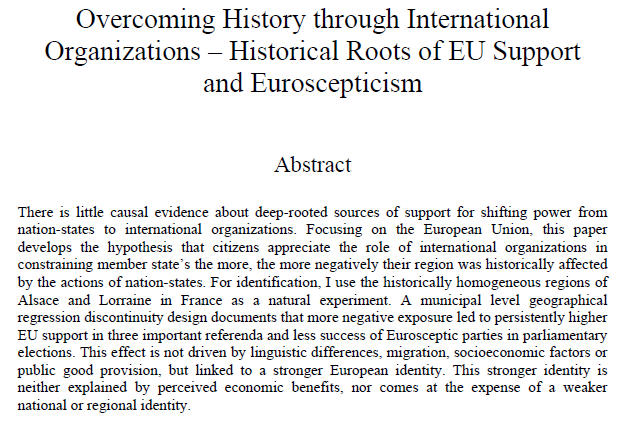
Prof Political Economy & Sustainable Development @Unibern @Wyss_for_Nature @ifo_Institut .
Also dad of two great kids, big sports and fantasy fan.
How to get URL link on X (Twitter) App


 Erstmal finde ich es gut, solche Gedanken aufzugreifen. Viele Leute beschäftigt das, ökonomische Forschung tut es ev. ein wenig vorschnell ab. Früher, z.b. bei Adam Smith wurde das mehr diskutiert.
Erstmal finde ich es gut, solche Gedanken aufzugreifen. Viele Leute beschäftigt das, ökonomische Forschung tut es ev. ein wenig vorschnell ab. Früher, z.b. bei Adam Smith wurde das mehr diskutiert.
 One example of what I mean, but when like me you start reading more interdisciplinary stuff you will find many in the area of sustainable development and climate research
One example of what I mean, but when like me you start reading more interdisciplinary stuff you will find many in the area of sustainable development and climate research

https://twitter.com/KaiGehring1/status/1448405881230708739For those interested in more information, similar opinions expressed by @GFelbermayr here. In addition he makes the good point that economics institutes can help in producing and disseminating further indicators beyond GDP
https://twitter.com/ProfSteveKeen/status/1447352332262383616?s=20
https://twitter.com/AnnaReisch1/status/1351959990442061824Zur Einstufung für andere:
https://twitter.com/CKemfert/status/1351795470914486272This seems very odd to me, @CKemfert, aren't you at DIW? Are the seminars there and the workshops you attend so formalized and detached? If yes, is sth. maybe wrong at DIW?

 Research question: Can external threats really create a joint identity and foster cooperation? This is a key question in social psychology, that is also relevant for economics and political science, as identity influences political preferences &decision-making in federal systems?
Research question: Can external threats really create a joint identity and foster cooperation? This is a key question in social psychology, that is also relevant for economics and political science, as identity influences political preferences &decision-making in federal systems?

 Cooperation in International organizations is one proposed way to maintain peace between nation-states that were formerly bitter enemies. The European Union is the most ambitious of these attempts, and at least no major conflict among member-states since WW2.
Cooperation in International organizations is one proposed way to maintain peace between nation-states that were formerly bitter enemies. The European Union is the most ambitious of these attempts, and at least no major conflict among member-states since WW2.